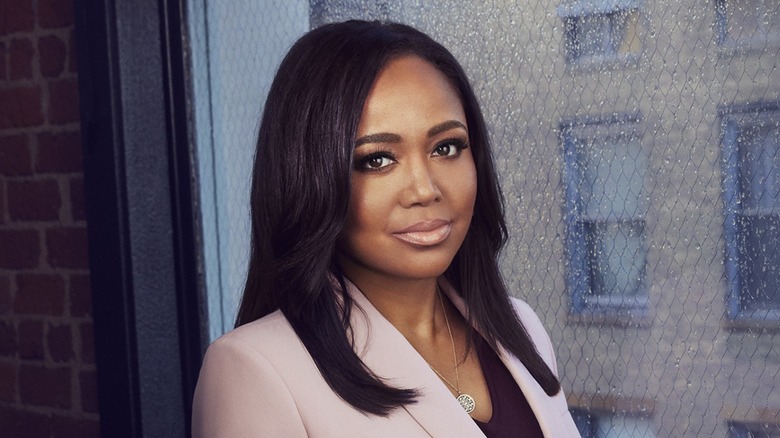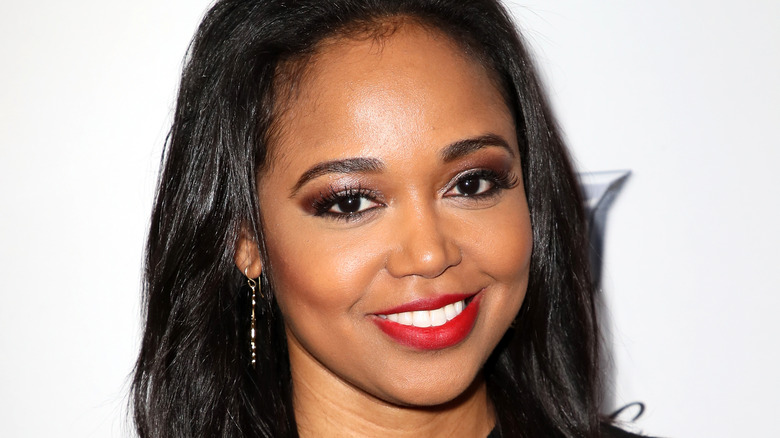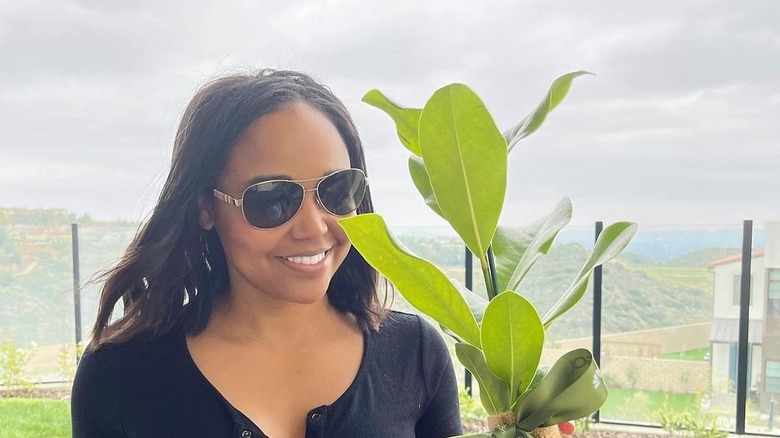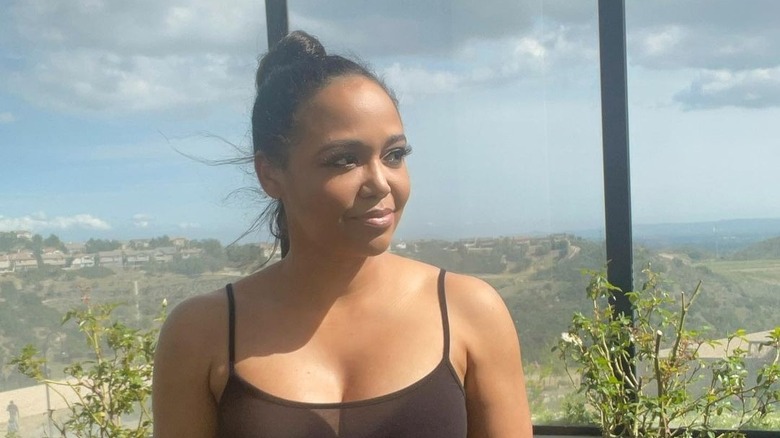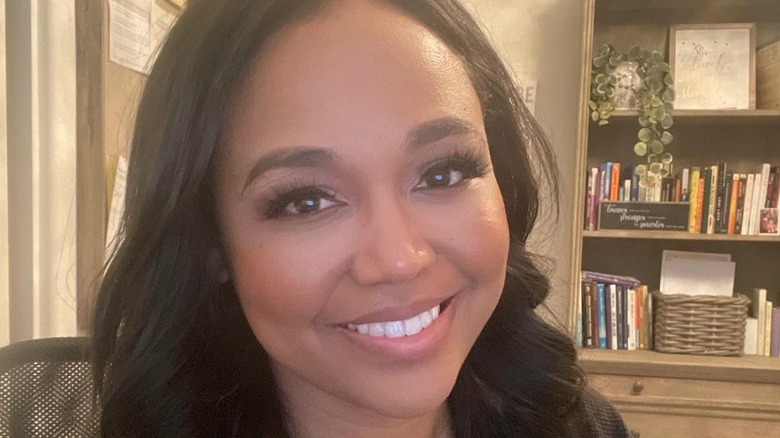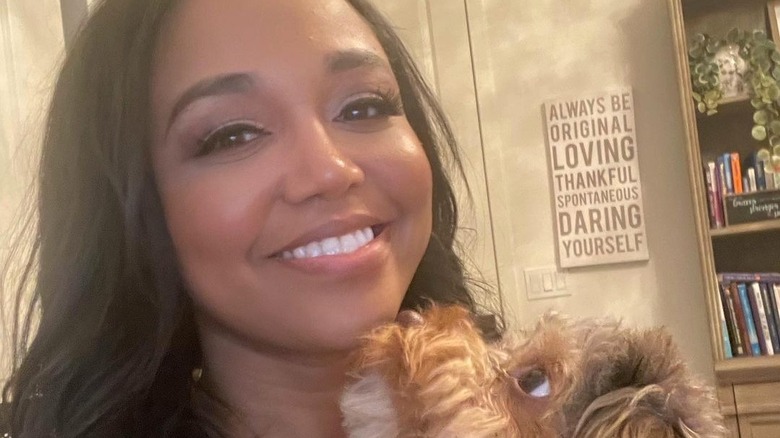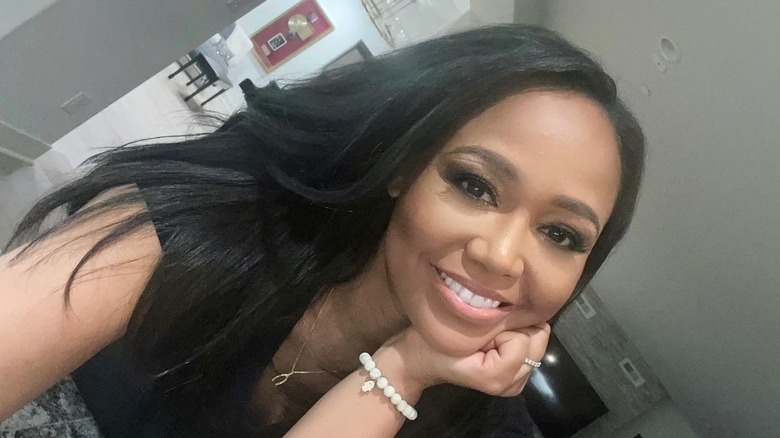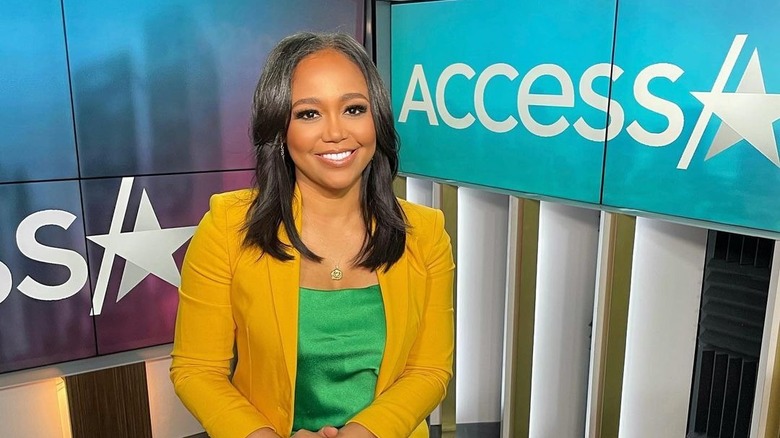Killer Relationship's Faith Jenkins Digs Deep Into Romance Red Flags - Exclusive Interview
This interview contains discussion of domestic abuse and violence, including murder.
If anyone has had the opportunity to experience humanity at both its very best and very worst, it's Faith Jenkins. As Miss Louisiana in 2000 and first runner-up for Miss America in 2001, she not only rubbed shoulders with other talented and ambitious people, but she also traveled the country to advocate for causes important to her and offer inspiration and motivation to others, especially young people in underserved communities. And as a prosecutor, legal commentator, and judge on the hit show "Divorce Court," she saw in detail the profound emotional, financial, and personal toll broken relationships can take on those involved — along with cases of couples settling their differences with grace and maturity.
In her latest show, "Killer Relationship with Faith Jenkins" — now starting its second season on Oxygen — Jenkins dives even more deeply into the dynamics of toxic relationships, specifically those that ended in murder. The show asks a lot of tough questions: What would motivate someone in what appears to be a loving relationship to snap and do the unthinkable? How can the line between love and hate be so thin — and why do those close to the couple so often fail to see trouble on the horizon? The answers are as complex and messy as the relationships themselves. In an exclusive interview with Grunge, Jenkins shared some of what she's learned.
Pro bono legal work was a crash course in the dynamics of breakups
Could you tell me a bit about your professional experience with victims of domestic violence? How did this become a professional focus for you?
When I graduated law school, my first job out of school was in New York. I moved and actually started working for a big law firm doing corporate-type work. A few months into that job, the head of my group asked for volunteers to work in family court and handle cases for women who could not afford attorneys. It wasn't necessarily domestic violence cases; it was divorces, child custody, child support, child visitation issues.
My very first court appearances in New York were in family court. Very early on, I learned how to help navigate the ends of people's relationships. I was only 24 years old at the time, and I was handling cases for people who were twice my age. It was a very eye-opening experience because I saw the best in terms of how people were able to be mature and emotionally mature and move on and go their separate ways, but I also saw the worst.
She also learned why so many people stay in abusive relationships
Faith Jenkins [continued]: After five years at the corporate firm and having that experience, I moved on to the Manhattan District Attorney's office as a prosecutor. There, I handled all kinds of cases — street crime in New York. I always tell people, "I'll never see the city the same again because I know what goes on there now." [There was] so much I was unaware of as a citizen in general, but when you start handling cases and you get crime from all different areas in Manhattan, it's eye-opening, including subway crime. I had a phobia about riding the train for a while after I became a prosecutor because I had all these cases of crime happening on the train, but I also had a number of domestic violence cases. That is when I really started, in terms of how to handle these cases as a prosecutor, but also taking a more holistic approach to them and providing services to victims of domestic violence.
Often in these cases, what I would find is — probably in 90% of them — the victims would become uncooperative and would not want to go forward with the case, and it was because of a number of ancillary factors they were dealing with in their lives. Money — where do they go for support? They have children with this person. What happens? Most of the victims were women, I will say. Some were men, but most were women. It was a very eye-opening experience.
People would often say, "I don't understand why someone would stay in an abusive relationship." Well, I do, because I saw it, and if you think you're going to be homeless if you leave, some people say, "I would rather my kids have a roof over their heads." Their decision was based oftentimes on what kind of support they would have if they decided to exit the relationship so that they could make a transition and have a better life for themselves.
Killer Relationship was inspired by her curiosity about why some relationships become violent
Can you tell me about "Killer Relationship" and how you became involved with that?
I've been hosting court shows for the last five years, and one of the shows I was hosting was dealing with breakups altogether — it's called "Divorce Court."
Right at the beginning of the pandemic, I was thinking, "What if I brought a crime show together where it was about people who were going through breakups — or even not going through breakups? They wanted their relationship to end, but going their separate ways wasn't enough or going through a divorce wasn't enough." Outside of that, because we've expanded "Killer Relationship," it's not just romantic relationships this season. What makes people have these love relationships that start out so great and end with someone having to die? We answer that question this season.
Related to that, what are some ways that people can protect themselves in a new relationship and not get blinded by infatuation?
I like that question because so much of what I see ... When you watch the show this season, people think, "Oh, what are these warning signs? What are these red flags?" Look at the first episode, the premiere episode, this season. Let me back up to say this: Sometimes you don't see the warning signs, and there are no red flags, so you go into the relationship. Every relationship you get in, you take a risk. You take a risk on love. You take a risk that this will work out, that this will be something that elevates my life, not brings me down. In a lot of these cases, there were no warning signs or red flags in the beginning, but over time, things change because people change. You hope that people change for the better, but sometimes they change for the worse.
Even smart, successful people can end up in toxic relationships
Jenkins [continued]: In our first case this season, we have a young lady that we're highlighting — her name is Makeva Jenkins. She's a young African American entrepreneur, homecoming queen in high school, graduated at the top of her class, goes on to start her own successful business, and she meets someone at a church event. He's the son of a pastor. He checks off all of these boxes that she thinks are great for someone to date, someone to marry. But what happens is her success continues, and she continues to rise and she continues to excel — and some people can't handle it. Sometimes, those red flags are not about someone who's controlling. It's about how deeply insecure they are.
What happens when those insecurities rear [their] ugly heads? I've seen a lot of things now, hosting this show, being a prosecutor in Manhattan [and] working in family court, but this was one of those cases that still truly caught me by surprise.
Because in the end, it wasn't just the crime — it was the lengths that this person went through to cover it up and the people that they were willing to hurt to cover it up. It's really compelling. The feedback that I've gotten from the first season of the show ... People like to watch because they want to see, "Were there warning signs? Was there anything that gave off any inclination that it would go this far?" Sometimes there's not. Sometimes it is that someone makes a decision: "I don't want to have this life anymore, and this is the decision that I'm going to make to go in a different direction." It is the most extreme, violent decision that they can make, but they do it.
Faith Jenkins advises looking out for these relationship red flags
In your experience, are there any personality types that are likely to be attracted to potential abusers or likely to become abusers themselves?
There are some things that are extreme red flags — people who are aggressive towards you. When you have conflict ... Remember, when you're in a relationship and there's conflict, it's not about winning because you're on the same team. [In] any conflict, the resolve would be "what's best for us." But people who take the low road and use things to try to hurt you, personal details, personal information ... Are there secrets? Are there secrets that people will go to great lengths to keep a secret? Are there signs of narcissism?
Are there signs of someone being overly controlling, but they're disguising it as, "Oh, I love you so much. That's why I call you to make sure you're at work and I call you to see what you're doing for lunch and I call you to see what time you're coming home. It's because I love you"? [That is] a sign of someone who wants to be in control of another person's life, because they don't see their partner as a partner; they see them almost as property.
You don't own the other person in the relationship. You're in a partnership. All of those things come into play. What people found surprising about our show — and especially this season, with the cases that we have — there was a shock factor because the families and the friends who you see on camera interviewing knew the perpetrator and they knew the victim personally. Listen to what they say about the people involved, and you will find that in most of these cases, everyone was surprised. Sometimes, there's not a telltale sign.
Here's how you can help someone in an abusive relationship
What are some of the ways to help somebody who has left or is trying to leave an abusive relationship, if you know someone in that situation?
In the prosecutor's office — what I found in prosecuting domestic violence cases — the only way that we could successfully prosecute is if we had support programs in place to offer the victims. It became a bigger job than just me charging someone with a crime, when someone's life is affected and they're making tremendous life-changing decisions. We had programs in place and local programs in various cities across the country. There are similar local programs in various cities where you can be completely confidential, and you can reach out to someone and have a confidential conversation and see what resources are available to you to come up with a plan. If you're not in a position where you can get out immediately, you come up with a plan that's going to work for you and a plan that feels safe. You cannot do it alone, and you don't have to be alone, in making that transition and making that decision.
That's good to know. Why is it so hard for people who are in relationships and the people outside — and you've alluded to this several times — to recognize signs of potential abuse?
Well, before you can address red flags, you need to understand what they look like and why they're dangerous. Some people actually start to accept people's red flags as part of the package rather than warning signs. They then become vulnerable to this emotional, psychological, and sometimes even physical harm.
When you see a red flag, it's not in your best interest to stay and see, "Well, how red is this red flag? Can this red flag be managed? Can I change this person?" I always say, "People don't change because of other people. They change because it's something within themselves. They believe change is warranted." It's a mistake to try to coax, beg, plead, force someone to try to change for the better. That has to come from within. What you have to do is distance yourself from the person causing the harm until they get the help that they need and they actually show through their actions and not just their words that they're willing to do that.
This season of Killer Relationship focuses on root causes
Returning to the show, what do you hope viewers will learn from the second season of "Killer Relationship"?
This season, we showcase all kinds of killer relationships; it's not just romantic relationships. There are a lot of twists and turns, and people will be surprised. They won't see these twists and turns coming.
Also, we're going to answer the question in each episode that a lot of people have when they watch this show: We're going to answer the why. Why did this happen? What was the motive? What was the reason?
Finally, we don't do any shows or any cases where we don't have the victims' families' approval. You're going to hear from their families and their friends, and their words and telling the story of the victim is very powerful because these people's lives are going to be shared in a way where a lot of people will understand who they are and why they made the decisions they made. I think that you're going to feel a lot of empathy this season, but you're also going to learn what made a lot of these people snap.
Can you recommend any resources for people who think they're in an abusive relationship?
There's a national domestic violence hotline, which is easy to look up, but I always find that the local programs and local resources in your area are a great way to start. A lot of times, they'll have information about where you live in your community that a national program may not have access to.
Then, find a trusted friend or family member that you can talk to and confide in and make your plan to exit. There's no good thing that's going to come out of staying in a toxic, abusive relationship. Even if you think the person has the potential to change, give them the space to do that on their own.
Season 2 of "Killer Relationship with Faith Jenkins" premieres Sunday, May 28 at 7:00 p.m. ET/PT on Oxygen.
This interview has been edited for clarity.
If you or someone you know is dealing with domestic abuse, you can call the National Domestic Violence Hotline at 1−800−799−7233. You can also find more information, resources, and support at their website.
